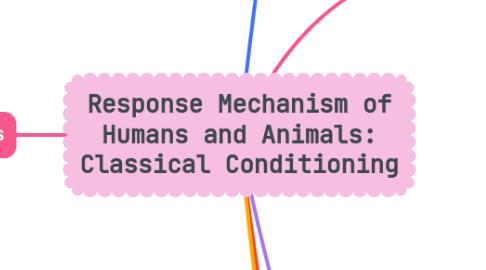
1. Zoological Concepts
1.1. Habituation
1.1.1. Decreased response to a repeated, neutral stimulus.
1.1.2. A dog becames less responsive to the sound of road noise after repeated exposures.
1.2. Sensitization
1.2.1. Increased response to a stimulus due to repeated exposure or significance.
1.2.2. A dog becomes more agitated when it hears a specific doorbell ring after a series of unpleasant events associated with that sound.
1.3. Operant Conditioning
1.3.1. Learning based on the consequences of behavior (rewards and punishments).
1.3.2. Training a dog to sit on command by giving it a treat each time it follows the command (positive reinforcement).
1.4. Imprinting
1.4.1. A form of learning where a young animal forms an attachment to a caregiver.
1.4.2. Puppies imprinting on their mother and learning behaviors such as how to play and interact.
1.5. Instinctive Behavior
1.5.1. Inherited behavior patters are exhibited without prior learning.
1.5.2. A dog instinctively digging the ground, which is a natural behavior for many dog breeds.
2. Classical Conditioning
2.1. Pavlov's Experiment
2.1.1. Unconditioned Stimulus
2.1.2. Unconditioned Response
2.1.3. Conditioned Stimulus
2.1.4. Conditioned Response
3. Psychological Concepts
3.1. Unconditioned Stimulus
3.1.1. A stimulus that naturally and autpmatically triggers a response without prior learning.
3.1.2. The smell of freshy baked bread, which naturally triggers a sense of comfort and hunger.
3.2. Unconditioned Response
3.2.1. An automatic, unlearned reaction to an unconditioned stimulus.
3.2.2. Flinching at a loud, unexpected noise like thunder storm.
3.3. Conditioned Stimulus
3.3.1. A previously neutral stimulus that, after association with an unconditioned stimulus, triggers a conditioned response.
3.3.2. A specific song that causes feelings of nostalgia and sadness because it was playing during a significant life event.
3.4. Conditioned Response
3.4.1. A learned reaction to a conditioned stimulus.
3.4.2. A person feeling anxious when they hear a dentist's drill sound, due to past experiences of dental pain.
4. Comparative Behavior
4.1. Behavioral Similarities
4.1.1. Both humans and dogs can develop conditioned responses to certain stimuli.
4.1.2. A specific sound or smell.
4.2. Behavioral Differences
4.2.1. The complexity and variety of conditioned responses can be more intricate in humans due to higher cognitive functions compared to dogs.
